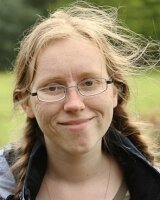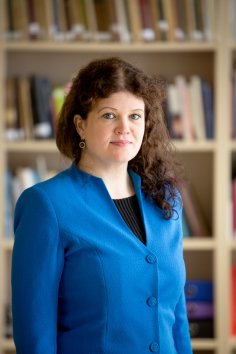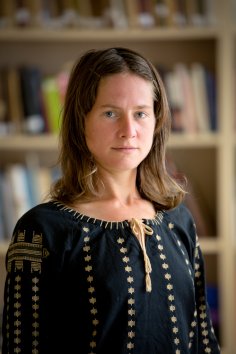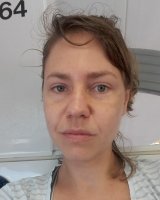Chair of Philosophy of Science
The Chair of Philosophy of Science teaches a variety of general and special courses related to the philosophy of science and epistemology. Historical, sociological and logical approaches are all employed in its educational and research activities. The main research topics include the distinguishing features of exact scientific knowledge, the methodology of science studies, and the philosophy of physics, chemistry and biology.
|
Image
|
Endla Lõhkivi Area of specialisation: Philosophy of science, social and cultural studies of science, social epistemology Postal address: E-mail: endla.lohkivi@ut.ee |
I started as a full-time lecturer at the University of Tartu Department of Philosophy in 1998 after obtaining my MA in philosophy from the same unit. Before that, I had been studying chemistry (I graduated at the equivalent of MSc level in 1985 from (what was then) the State University of Tartu), and I was admitted to PhD studies in Philosophy in 1991. I carried out part of my PhD studies at the University of Gothenburg (Göteborg), Sweden, and in 1999 I obtained from there the degree of filosofielicentiat. I got my PhD in 2002 from the University of Tartu. I took over the Chair of Philosophy of Science from its founder (Rein Vihalemm) in 2004: we are a small group of philosophers focused on the study of science in practice. Both the history of science and contemporary science are our interest. Mainly by pursuing philosophical analysis of the sciences and technology, we aim to understand the nature of the humanities and the social sciences, both locally and globally. Currently we are working on issues emerging at the intersection of various disciplines: we are carrying out a project on the philosophical analysis of disciplinary and interdisciplinary research.
Topics that I am interested in and ready to supervise theses on include various aspects of scientific collaboration, the division of labour in the sciences, conceptual development, the cultural circumstances of research, knowledge and power, etc. As a former chemist, I am interested in the philosophy of chemistry and the history of chemistry. I am also interested in the meta-methodological analysis of the philosophy of science i.e. specifically, in how empirical evidence can be used in philosophy of science.
I have taught and teach various introductory courses in philosophy, epistemology, philosophy of science, social epistemology of science, feminist accounts of science, values in the sciences, science and material culture, knowledge and power, etc. But I also teach courses on methodological issues within the philosophy of science, issues in the history of science and empirically informed philosophy of science.
I've published several interviews with visiting scholars in the Estonian cultural weekly Sirp (2016, 2018, 2021) as well as articles in the Univesrity of Tartu journal "UT" and the University of Tartu International Blog, as well as the Blog of the University of Prague (2015). In 2021 March I argued in favour of building a new library in the centre of Tartu in the local newspaper Tartu Postimees. Back in 2012, I participated in a radio broadcast on Radio Station "Kuku" (the show was "The Falling Apple") with our chair's founder Rein Vihalemm.
PRG462 "Philosophical analysis of interdisciplinary research practices".
The project aims to contribute to the philosophy of science in practice where science is approached as an activity in its historical and cultural context. Our theoretical basis is the practical realist account of science. The project makes use of the framework of micro-social epistemology and the empirical method previously adapted by the research team for the study of culture of science. The objective of the study is to explicate how interdisciplinary research methods are created and sustained, what are the benefits and problems in the development of interdisciplinarity, and what is the role of researchers’ epistemic identity in this process. Implications for research evaluation are also addressed. The dynamics of disciplinary and interdisciplinary research is explored with the help of both historical and contemporary examples from bio- and social sciences, chemistry, law, engineering, animal research, archaeology, humanities, and areas related to information technologies.// Centre of Excellence in Estonian Studies (CEES) project (SHVHV16145T, 2016-2023, PI Mare Kõiva). The Centre brings together 15 research groups with more than 60 researchers in addition to more than 50 post-graduate students from the Estonian Literary Museum, the University of Tartu (from the sphere of the humanities and arts as well as from the natural and exact sciences), the Institute of the Estonian Language, Tallinn University, the Estonian Academy of Music and Theatre, and the Institute of Cybernetics at the Tallinn University of Technology. The Centre studies the linguistic and cultural dimensions of Estonia and Estonian identity, both from a historical and contemporary perspective.
Eigi, Jaana; Velbaum, Katrin; Lõhkivi, Endla; Simm, Kadri; Kokkov, Kristin (2018). Supervision, mentorship and peer networks: how Estonian early career researchers get (or fail to get) support. Roars Transactions (RT). A Journal on Research Policy and Evaluation, 6 (1), 1−16.
Eigi, J., Põiklik, P., Lõhkivi, E., Velbaum, K. (2014). Supervision and Early Career Work Experiences of Estonian Humanities Researchers under the Conditions of Project-based Funding , Higher Education Policy, 453-468.
Lõhkivi, E., Velbaum, K., Eigi, J. (2012). Epistemic Injustice in Research Evaluation: A Cultural Analysis of the Humanities and Physics in Estonia. Studia Philosophica Estonica, Special Issue “Towards Practical Realist Account of Science”, 5(2), 108 – 132.
Lõhkivi, Endla (2011). Identity and rationality: towards normative cultural studies of science. Baltic Journal of European Studies, 9(1), 97 - 110.
Velbaum, K.; Lõhkivi, E.; Tina, M.-L. (2008). UPGEM National Report Estonia. Draw the Line! Universities as workplaces for male and female researchers in Europe, Published by the EC 6th FP Project UPGEM: Understanding Puzzles in the Gendered European Map (137 - 212). Tartu: University of Tartu.
Hasse, C.; Rolin, K.; Ajello, A. M.; Lõhkivi, E.; Helle, M. (2008). Concluding UPGEM Recommendations. In: Draw the Line! International Conference, Copenhagen 2008, Papers, proceedings and recommendations: Draw the Line! International Conference; Copenhagen; May 30-31, 2008. (Eds.) Hasse, C.; Trentemoller, S.; Bjerregaard Sinding, A. Tartu: Tartu University Press, 2008, 103 – 123.
Lõhkivi, E. (2008). Social Changes and Changes in Science Management: the Estonian Case. In: Draw the Line! International Conference, Copenhagen 2008, Papers, proceedings and recommendations: Draw the Line! International Conference; Copenhagen; May 30-31, 2008. Hasse, C.; Trentemoller, S.; Bjerregaard Sinding, A. (Eds.) Tartu: Tartu University Press, 2008, 93 – 98.
Lõhkivi, E. (2004). What Models Can Do: A Study of the Use of the Concept of Model in Biosensor Research. Vihalemm, R.; Earley, J.E.; Hallap, T. (Eds.). Studia Philosophica Special Issue: Proceedings of the 7th Summer Symposium of the International Society for the Philosophy of Chemistry (Tartu, 16-20 August, 2003) (53 - 68). Tartu: Tartu University Press
Lõhkivi, Endla (2003). Pluralism tunnetusteoorias: Helen Longino sotsiaalepistemoloogiline lahendus traditsioonilise ratsionalismi ja sotsioloogilise relativismi tülile. Ariadne Lõng, 1/2, 56 – 64.
Lõhkivi, Endla (2002). The "Science Wars" and the Duhem-Quine Argument of Underdetermination. Trames, 2, 141 – 172.
Lõhkivi, Endla (2002). The sociology of scientific knowledge: a philosophical perspective. Tartu: Tartu University Press, 115 pp.
Edited:
Müürsepp, P. (editor- in - chief); Lõhkivi, E., Mets, A., editors and authors of the "Foreword 2019" of Rein Vihalemm „A Story of a Science: On the Evolution of Chemistry“ translated into English and published in Acta Baltica Historiae et Philosophiae Scientiarum 7.2 2019.
Lõhkivi, E., Vihalemm, R. (eds.) (2012). Special Issue "Towards a Practical Realist Account of Science". Studia Philosophica Estonica, 5 (2), 1−186.
Rolin, K., Hasse, C., Lõhkivi, E. (eds.) (2011). "Science Studies: An Interdisciplinary Journal for the Science and Technology Studies" Special Issue "Gender, Physics and Workplace Culture". Science Studies, 24 (1), 4−80. (Since 2014 Science and Technology Studies)
2022 - … EENPS, Head of the Local Organising Committee of the East European Network of Philosophy of Science (EENPS).
2020 - … Member of the AcademiaNet https://www.academia-net.org/
2015−... Member of the Board of the Estonian Association of the History and Philosophy of Science
2014 – 2018 Member of the management committee of COST Action IS1307: New Materialism: Networking European Scholarship on 'How Matter Comes to Matter'.
2008 - … Member of European Philosophy of Science Association (EPSA) and the Society for the Studies of Science in Practice (SPSP)
2001 - ... Member of International Society for Philosophy of Chemistry (ISPC).
2000 - ... Member of the editorial board of the Estonian journal of academic gender studies “Ariadne Lõng” (“Ariadne’s Clew”).
1996 - ... Member of European Association for the Studies of Science and Technology (EASST) and European Society for Analytic Philosophy (ESAP).
|
Image

|
Jaana Eigi-Watkin Area of specialisation: Philosophy of Science (social aspects of science) Postal address: E-post: jaana.eigi@ut.ee
|
I have worked at the University of Tartu in various roles since 2009. I have been in my current role of Research Fellow in Philosophy of Science since 2016. I received my PhD degree ("The Social Organisation of Science as a Question for Philosophy of Science") from the University of Tartu in 2016. My BA (2007) and MA (2009) degrees are from the University of Tartu as well.
My main research interests concern the social aspects of science, broadly understood. I am interested in the place of social values and social factors in science, the relations between science and democratic society, potential roles for non-scientists in science, Open Science and citizen science. Relatedly, I am interested in the notion of scientific objectivity (especially social accounts of objectivity) and issues connected to inductive risk. As a member of the research group led by Dr Endla Lõhkivi, I take part in research where we analyse qualitatively interviews we have conducted with researchers in order to identify the epistemic impacts of their work conditions and cultures. I am currently a co-supervisor of a PhD thesis on objectivity in animal research. I am open to supervision requests related to my interests.
I have taught courses on some of the social aspects of science and on inductive risk as well as reading groups for specific books in social epistemology and the philosophy of science. I have contributed to various introductory courses giving seminars in philosophy and history of science. I have also taught courses on philosophical writing and supervised the MA seminar.
I have published two popular articles introducing my research in the Estonian cultural weekly "Sirp". A longer version of one of them was also published by ERR, the national broadcaster in Estonia.
Currently, I am working as a researcher in the Estonian Research Council project “Philosophical Analysis of Interdisciplinary Research” (2019-2023) with Dr Endla Lõhkivi and other colleagues and the European Union Horizon 2020 project "ROSiE: Responsible Open Science in Europe" (2021-2024) with Dr Kadri Simm. I am also a researcher with the Centre of Excellence in Estonian Studies (TK145).
1) Eigi, J., Põiklik, P., Lõhkivi, E., & Velbaum, K. (2014). Supervision and early career work experiences of Estonian humanities researchers under the conditions of project-based funding. Higher Education Policy, 27(4), 453-468. 2)
Eigi, J. (2012). Two Millian arguments: Using Helen Longino’s approach to solve the problems Philip Kitcher targeted with his argument on freedom of inquiry. Studia Philosophica Estonica, 5(1), 44-63. 3)
Eigi, J. (2017). Different motivations, similar proposals: objectivity in scientific community and democratic science policy. Synthese, 194(12), 4657-4669. A complete list of my publications is available from https://philpeople.org/profiles/jaana-eigi-watkin
I am a member of the Estonian Association for History and Philosophy of Science, European Philosophy of Science Association, and the East European Network for Philosophy of Science.
|
Image

|
Edit Talpsepp Area of specialisation: Philosophy of Science (Biology) Postal address: E-mail: edit.talpsepp@ut.ee |
I have worked at the Department as a Research Fellow since 2013. I hold a PhD thesis in Philosophy from University of Bristol, UK (thesis title 'Species, Essentialism and Evolutionary theory', 2013). Prior to that, I gained an MA degree in Philosophy and History of Science also from University of Bristol (2007). I did my BA degree in Philosophy in University of Tartu.
I have supervised BA and MA theses in Philosophy of Biology. My main area of specialization is also Philosophy of Biology. More specifically, I am interested in essentialism as it applies to biological species and to human groups, and the relationship between the Philosophy of Biology and socio-political issues.
The main course that I currently teach at the Tartu Department is Philosophy of Biology, but I recently ran a reading group on the processual Philosophy of Biology of John Dupre. In the past I have taught courses on general philosophy of science, scientific revolutions, essentialism concerning different human groups, the relationship between Philosophy of Biology and society, amongst others. I have also contributed to courses on the history of scientic ideas and the social and ethical aspects of engineering. During my PhD days in England, I taught introductory courses on logic and the Philosophy of Religion.
I have given some public talks, been a guest on the radio science programme 'Labor', published in the Estonian cultural newspaper 'Sirp' and the world's most widely read journal for popular philosophy 'Philosophy Now'. I have also published an article on the relationship between philosophy and human rights issues in the university of Tartu blog, an article on pragmatism in the Estonian journal of architecture 'Maja'. Currently I am writing a series of articles on the main questions of philosophy of biology for Estonia's most high profile popular science journal 'Horisont'. In 2014 I was a participant in a public debate on the wage gap (an event organized by the Estonian Ministry of Social Affairs).
Centre of Excellence in Estonian Studies (CEES) project (SHVHV16145T, 2016-2023, PI Mare Kõiva). The Centre brings together 15 research groups with more than 60 researchers in addition to more than 50 post-graduate students from the Estonian Literary Museum, the University of Tartu (from the sphere of the humanities and arts as well as from the natural and exact sciences), the Institute of the Estonian Language, Tallinn University, the Estonian Academy of Music and Theatre, and the Institute of Cybernetics at the Tallinn University of Technology. The Centre studies the linguistic and cultural dimensions of Estonia and Estonian identity, both from a historical and contemporary perspective.// PRG462 "Philosophical analysis of interdisciplinary research practices". The project aims to contribute to the philosophy of science in practice where science is approached as an activity in its historical and cultural context. Our theoretical basis is the practical realist account of science. The project makes use of the framework of micro-social epistemology and the empirical method previously adapted by the research team for the study of culture of science. The objective of the study is to explicate how interdisciplinary research methods are created and sustained, what are the benefits and problems in the development of interdisciplinarity, and what is the role of researchers’ epistemic identity in this process. Implications for research evaluation are also addressed. The dynamics of disciplinary and interdisciplinary research is explored with the help of both historical and contemporary examples from bio- and social sciences, chemistry, law, engineering, animal research, archaeology, humanities, and areas related to information technologies.
Talpsepp, Edit (2015) ‘Biological Essentialism concerning the Species Category’, In: Uskali Mäki, Ioannis Votsis, Stephanie Ruphy, Gerhard Schurz (Ed.). Recent Developments in the Philosophy of Science: EPSA 13 Helsinki, European Studies in the Philosophy of Science. Springer, lk 369−380. Talpsepp, Edit (2021) 'Interview with John Dupré'. Philosophy Now: The Ultimate Guide to the Theory of Knowledge. Issue Four, pp 76-78. Talpsepp, Edit (2016) ‘Introducing the Relationship between Human Rights Issues and
Philosophy of Biology.’ University of Tartu blog, https://blog.ut.ee/introducing-the-relationship-between-human-rights-issues-and-philosophy-of-biology/
European Philosophy of Science Association (EPSA), The International Society for the History, Philosophy, and Social Studies of Biology (ISHPSSB), The Estonian Union of History and Philosophy of Science
|
Image

|
Ave Mets Area of specialisation: Philosophy and History of Science and Technology, Epistemology Postal address: E-mail: ave.mets@ut.ee
|
I received my BA (2003), MA (2007), and PhD (2013) from the University of Tartu. I spent four years of my doctoral studies at RWTH Aachen University (2009-2013) and was a post-doctoral exchange visitor at the Belarusian State University between 2015 and 2016. I have been a research fellow in Philosophy of science at the University of Tartu since 2014.
My main area of research is the philosophy of science. Within the philosophy of science, my primary interest is in the theory of measurement, philosophy of chemistry, the scientific picture of the world and the normativity of laws of nature. In several recent papers, I have focused on engaging critically with measurement theory from the point of view of practical realism with regard to chemical elements and periodic tables. I have also published on the Philosophy of Technology and Artificial Intelligence.
I have taught courses in the history and philosophy of science, the ethics of technology and AI both at the University of Tartu and at other universities through the Erasmus and Nordplus networks.
Some of the graduate-level courses I taught at the University of Tartu include "The Philosophy of World Pictures" (Fall 2014-2015); "Constructionism in the Philosophy of Science" (Fall 2015-2016); "Ideological and Historical Foundations of Contemporary Science" (Spring 2018-2019).
She has also led several reading groups and graduate individual studies in the Philosophy of Science.
I have published several articles in the Estonian daily newspaper Postimees popularizing science in Estonian. I have also appeared on the Estonian National Broadcasting Corporation's national (ERR) radio channel discussing laws of science. As a member of the Estonian Green Party, I have published an article in defense of LGBT rights on the party’s website.
Currently, I am a researcher with the Centre of Excellence in Estonian Studies (TK145) and also a researcher in the project “Philosophical Analysis of Interdisciplinary Research” (2019-2023). The aim of the project is to contribute to the philosophy of science in practice where science is approached as an activity in its historical and cultural context. The theoretical basis of the project is the practical realist account of science. The project makes use of the framework of micro-social epistemology and the empirical method previously adapted by the research team for the study of culture of science. The objective of the study is to explore how interdisciplinary research methods are created and sustained, what are the benefits and problems in the development of interdisciplinarity, and what is the role of researchers' epistemic identity in this process. Implications for research evaluation are also addressed.
- Mets, Ave (forthcoming). Can artificial intelligence become a member of the society as an autonomous personality? Journal of the Belarusian State University. Philosophy and Psychology.
- Mets, Ave (2020). A Measurement-Theoretic View on the Early Evolution of the Ordering of Chemical Elements. Acta Baltica Historiae et Philosophiae Scientiarum, 8 (1), 5−32. DOI: 10.11590/abhps.2020.1.01.
- Mets, Ave (2019). A Philosophical Critique of the Distinction of Representational and Pragmatic Measurements on the Example of the Periodic System of Chemical Elements. Foundations of Science, 24:1 (1), 73−93. DOI: 10.1007/s10699-018-9567-x
- Mets, Ave (2018). Female mountain, masculine mining: an interpretation of Entbergen. Eidos, 29,
119−149.
- Mets, Ave (2018). Normativity of scientific laws (I): Two kinds of normativity. Problemos, 93, 60−69. DOI: 10.15388/Problemos.2018.93.11751.
I am a member of the Baltic Association of the History and Philosophy of Science and a member of the International Relations Committee of the Philosophy of Science Association.
|
Image

|
Riin Kõiv Areas of specialisation: nature-nurture debate, concept of innateness, genetic causation and genetic information, genetic essentialism, biologistic explanations of psychological and cultural phenomena, philosophy of mind (naturalistic theories of content and representation), social constructionism, the philosophy of Ludwig Feuerbach Postal address: E-mail: riin.koiv@ut.ee
|
My research intersects philosophy of science (biology), philosophy of mind and social philosophy. I am interested in the nature and reach of various biological explanations of human phenomena. I have tackled conceptual issues that arise in the context of scientific nativist hypotheses that claim some trait to be innate, genetically caused, or an adaptation). What does it mean to be innate? Which notion of "cause" is implied in ascriptions of genetic causation in empirical contexts? What do empirical nativist hypotheses imply for certain further philosophical questions regarding the nature of the mind and the metaphysics of human categories? One aim I have in asking such quesitons is to identify the variable ways in which "innate", "genetically caused", "inherited" traits, can nevertheless be a function of the environment, including the social environment. In connection with the latter, my work also touches upon social constructionist debates. I also have a background and a continuing interest in historical forms of materialist/naturalist philosophy.
I regularly teach introductory philosophy courses. I also deliver graduate courses in in my own area of specialization that focus on naturalistic explanations of the human mind and human behavior.
I have published a number of newspaper articles and given a couple of public lectures that popularize and apply philosophical ideas.
- 2018. „Mis on loomus/loomulik?“ (What is nature/natural?). Vaba Akadeemia lecture series. https://www.youtube.com/watch?v=8NEaZ9qHvIM
- 2018. “Sugu: mis ja millest me räägime?”(Sex/Gende: Why and What are We Talking About?). (opinion piece in Eesti Päevaleht, Estonian daily newspaper) (2018). https://epl.delfi.ee/artikkel/81101591/sugu-ja-sugu-kuidas-ja-millest-m…
- 2017. An interview on the translation of Ludwig Feuwebach’s selected writings. Estonian national radio. https://klassikaraadio.err.ee/740348/delta-ludwig-feuerbach-tuleviku-fi…
- 2016. “Colombiast läbi filosoofi silmade” (Colombia through the eyes of a philosopher). An interview with Catalina González. Sirp. https://www.sirp.ee/s1-artiklid/c9-sotsiaalia/colombiast-labi-filosoofi…
I am working as an assistant in the Estonian Research Council project “Philosophical Analysis of Interdisciplinary Research” (2019-2023)
1) 2021. “Innate Mind Need Not Be Within”. Acta Analytica, 36, 101–121; 2) 2020.“Elusive vehicles of genetic representations”. Biology and Philosophy, 35 (24), https://doi.org/10.1007/s10539-020-9741-8; 3) 2019. “Causal Social Construction”. Journal of Social Ontology, 5 (1), 77−99.


